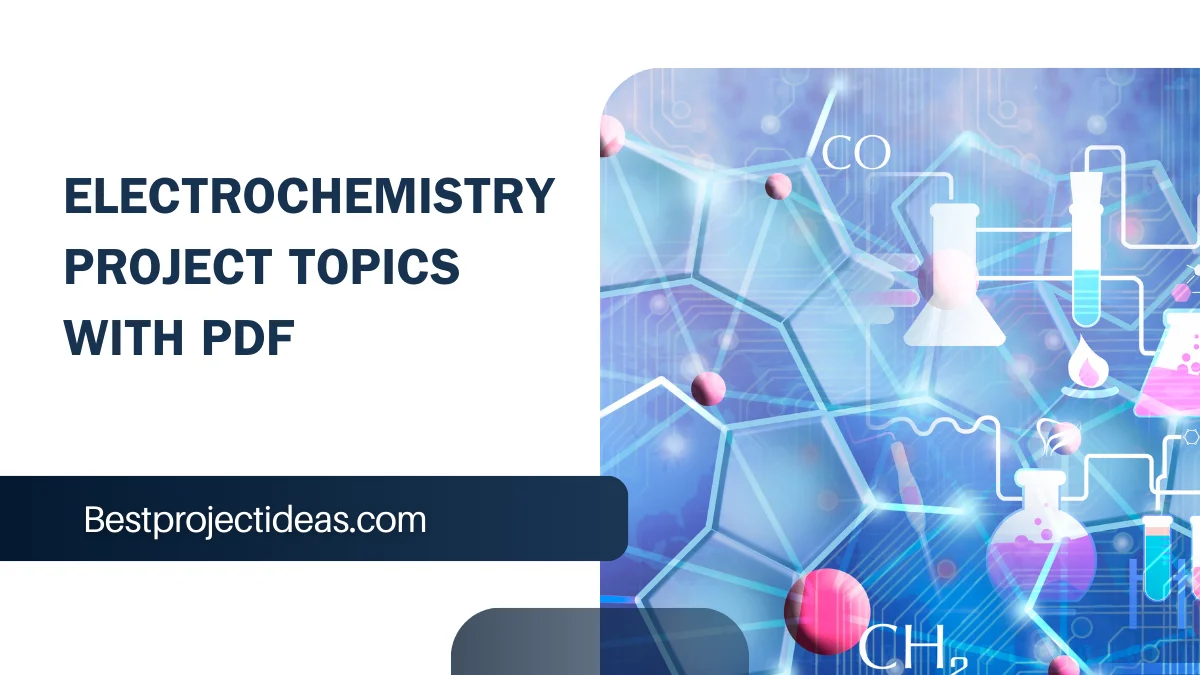
Did you know that mixing some chemicals can make electricity? That’s the exciting world of electrochemistry! Just like how batteries make your toys work, electrochemistry shows the cool link between electricity and chemical reactions.
Today, we’ll look at some fun electrochemistry project ideas that can make you feel like a real scientist. From making a battery with lemons to putting shiny coatings on things, these hands-on activities will show you how chemistry and electricity work together to do amazing things. Get ready for experiments that are safe, fun and will make your friends say, “Wow!
Must Read: 180 Unique Passion Project Ideas For High School Students (2024)
What Research Does Electrochemistry Focus On?
Electrochemistry is a vital field that studies how electrical and chemical processes connect. It includes studying energy storage in batteries and fuel cells, materials science for corrosion and surface changes, and sensors for detection.
Industries use it in chemical production and water cleaning, while biology looks at nerve signals and pharmaceutical delivery. This field helps improve energy use, improve manufacturing, and advance medical tools. Researchers keep working to make batteries more efficient, create new materials, and find ways to solve environmental problems with electrochemistry.
Electrochemistry Project Topics For Class 12 Students
Here are the best Electrochemistry Project Topics For Class 12 Students:
Battery Technology and Energy Storage
- Comparing electrolyte concentration effects on zinc-carbon battery performance
- Building fruit-powered batteries using different citrus combinations
- Testing temperature impacts on rechargeable battery efficiency
- Creating aluminum-air batteries from household materials
- Measuring potato conductivity for bio-battery power generation
- Analyzing salt bridge designs in copper-zinc voltaic cells
- Investigating LED brightness with series-connected lemon batteries
- Building hydrogen fuel cells using a simple electrolysis setup
- Testing battery life extension through electrolyte modifications
- Comparing metal electrode combinations for maximum voltage output
- Studying coffee grounds as carbon electrode material
- Exploring graphite powder conductivity in homemade batteries
- Creating coin cell batteries using household chemicals
- Testing seawater battery electrical conductivity variations
- Building solar-rechargeable battery storage systems
- Analyzing temperature effects on battery degradation rates
- Comparing electrode surface area impact on power
- Measuring pH changes during battery discharge cycles
- Testing different separators in lead-acid battery models
- Building capacitor-based energy storage demonstrations
Corrosion Studies
- Analyzing rust formation rates in different environments
- Testing natural corrosion inhibitors on iron nails
- Comparing metal corrosion in acid rain solutions
- Studying temperature effects on aluminum oxidation rates
- Measuring salt spray impact on steel samples
- Testing vitamin C as a copper corrosion inhibitor
- Analyzing paint coating effectiveness against metal rusting
- Comparing coastal versus inland metal degradation rates
- Studying zinc coating protection of iron surfaces
- Testing honey as natural rust prevention coating
- Measuring pH effects on brass corrosion rates
- Analyzing soil composition impact on underground pipes
- Studying electrical current effects on metal degradation
- Testing coffee as an iron corrosion inhibitor solution
- Comparing different metals in saltwater exposure
- Measuring oxygen concentration effects on rusting
- Analyzing temperature cycling on metal protection films
- Testing plant extracts for corrosion prevention properties
- Studying humidity effects on zinc surface oxidation
- Comparing industrial versus natural corrosion inhibitors
Electroplating and Surface Treatments
- Creating decorative copper patterns through selective plating
- Testing current density effects on nickel coating
- Analyzing temperature impact on zinc electrodeposition
- Comparing different metal plating on plastic surfaces
- Studying pulse plating versus continuous current methods
- Testing natural additives in copper plating baths
- Creating artistic designs through controlled metal deposition
- Measuring pH effects on chrome plating quality
- Analyzing surface preparation impact on coating adhesion
- Testing different anode materials for gold plating
- Studying agitation effects on plating thickness uniformity
- Comparing direct versus reverse current plating results
- Creating multicolor metal finishes through layered plating
- Testing organic brighteners in silver plating solutions
- Analyzing temperature cycling on coating durability
- Measuring current efficiency in brass plating
- Studying metal distribution in complex-shaped objects
- Testing eco-friendly alternatives to chromium plating
- Creating decorative patterns through masked electrodeposition
- Comparing different metal salt concentrations effects
Electrolysis Applications
- Splitting water using different electrode materials
- Testing current efficiency in copper purification
- Analyzing temperature effects on chlorine production
- Creating hydrogen fuel through water electrolysis
- Studying electrode spacing impact on gas production
- Testing salt concentration effects on electrolysis rate
- Measuring pH changes during the water decomposition process
- Analyzing current density impact on product yield
- Creating oxygen generators for small-scale use
- Testing different electrolytes for aluminum extraction
- Studying membrane effects on gas separation efficiency
- Comparing graphite versus metal electrode performance
- Creating chlorine through brine solution electrolysis
- Testing temperature effects on reaction efficiency
- Analyzing voltage impact on product formation rates
- Measuring current requirements for metal recovery
- Studying electrode material longevity in operation
- Testing continuous flow versus batch processing
- Creating pure copper from scrap metal waste
- Comparing different cell designs for efficiency
Electrochemical Sensors and Analysis
- Building glucose sensors using enzymatic electrodes
- Testing pH meters with different electrode materials
- Creating oxygen sensors for water quality testing
- Analyzing metal ion detection in water samples
- Studying temperature compensation in conductivity measurements
- Testing chemical sensors for food freshness detection
- Measuring dissolved oxygen in aquarium water
- Creating chlorine detectors for swimming pools
- Analyzing soil conductivity with different moisture levels
- Testing salinity sensors for marine applications
- Studying ion-selective electrodes for water testing
- Comparing different reference electrode designs
- Creating carbon dioxide sensors for air quality
- Testing heavy metal detection in water samples
- Analyzing electrode coating effects on sensitivity
- Measuring nitrate levels in soil solutions
- Studying temperature effects on sensor accuracy
- Testing biosensors for chemical contamination detection
- Creating pH indicators using natural materials
- Comparing different sensor materials’ performance
Environmental Applications
- Testing water purification through electrolysis methods
- Analyzing electrochemical treatment of wastewater
- Creating solar-powered water treatment systems
- Studying metal recovery from electronic waste
- Testing air pollution monitoring with sensors
- Measuring soil contamination using electrode arrays
- Analyzing groundwater quality with sensor networks
- Creating biodegradable batteries from natural materials
- Testing the environmental impact of different electrolytes
- Studying energy efficiency in water treatment
- Analyzing electrode materials for pollutant removal
- Creating renewable energy storage solutions
- Testing water hardness removal using electricity
- Studying salt removal from brackish water
- Analyzing the carbon footprint of battery production
- Creating eco-friendly corrosion protection methods
- Testing natural water filtration systems
- Studying toxic metal removal from soil
- Creating sustainable electroplating alternatives
- Testing green chemistry approaches in electrochemistry
Electrochemistry in Daily Life
- Testing battery life in different electronic devices
- Analyzing electrolyte drinks for conductivity levels
- Creating emergency power sources from household items
- Studying static electricity in everyday materials
- Testing metal reactivity in kitchen utensils
- Measuring battery drainage in different conditions
- Analyzing corrosion in bathroom fixtures
- Creating simple electrical conductivity testers
- Testing water quality in-home systems
- Studying electrode effects in water purifiers
- Analyzing battery recycling methods at home
- Creating household metal cleaning solutions
- Testing anti-corrosion methods for tools
- Studying electrical properties of food items
- Analyzing battery alternatives for devices
- Creating emergency lighting using electrochemistry
- Testing metal plating on household items
- Studying water electrolysis in daily life
- Creating simple voltage testers at home
- Testing battery storage best practices
Innovation and Future Technologies
- Creating printable batteries using conductive inks
- Testing flexible electrode materials for wearables
- Analyzing nanomaterial effects in battery design
- Studying wireless charging efficiency improvements
- Testing bio-based battery components development
- Creating innovative corrosion monitoring systems
- Analyzing self-healing electrode materials research
- Studying quantum effects in electrochemical cells
- Testing artificial photosynthesis system designs
- Creating new electrolyte material combinations
- Analyzing Future Battery Recycling Methods
- Studying advanced sensor development techniques
- Testing novel electrode coating materials
- Creating bio-inspired energy storage systems
- Analyzing smart grid integration solutions
- Studying next-generation fuel cell designs
- Testing advanced materials for supercapacitors
- Creating innovative battery charging methods
- Analyzing future transportation power sources
- Studying renewable energy storage solutions
Electrochemistry Project Topics for College Students
- Development of a DIY Electrochemical Cell
- Design a primary galvanic cell with common materials
- Test voltage output under different setups
- Compare various electrode materials
- Corrosion Rate Analysis
- Examine corrosion rates in different metals
- Observe environmental factors affecting corrosion
- Create protective coatings
- Electroplating Optimization
- Explore factors impacting electroplating quality
- Compare metal plating solutions
- Study effects of current density
- Battery Performance Analysis
- Compare types of batteries
- Examine how temperature affects performance
- Observe charging and discharging cycles
- Electrolysis of Water
- Build an efficient water electrolysis setup
- Test different electrode materials
- Improve hydrogen output
- Fruit Battery Construction
- Test different fruits as electrolytes
- Measure voltage changes
- Study series and parallel configurations
- Metal Recovery from E-waste
- Extract metals from electronic waste
- Evaluate extraction efficiency
- Analyze economic feasibility
- Solar-Powered Electrochemical Cell
- Create a solar-powered electrochemical system
- Study energy conversion rates
- Enhance storage capability
- Electrochemical Sensors
- Develop ion-specific sensors
- Test selectivity and sensitivity
- Fine-tune performance
- Supercapacitor Development
- Build a basic supercapacitor
- Test electrode materials
- Measure charge storage
- pH Sensor Construction
- Construct an electronic pH meter
- Compared with commercial devices
- Study temperature effects
- Metal Surface Treatment
- Study anodizing processes
- Examine surface properties
- Improve treatment conditions
- Electrochemical Cleaning
- Create cleaning solutions
- Test on various materials
- Optimize cleaning settings
- Hydrogen Fuel Cell Model
- Build a simple fuel cell
- Study efficiency factors
- Improve operation conditions
- Electrochemical Etching
- Test different etching patterns
- Compare electrolytes
- Optimize parameters
- Copper Electro-winning
- Extract copper from solutions
- Study current efficiency
- Improve process conditions
- LED Electroluminescence
- Study electrochemical LED systems
- Measure efficiency
- Test different materials
- Electrochromic Device
- Create a color-changing display
- Test switching speed
- Improve performance
- Salt Bridge Design
- Test bridge materials
- Study ion transport
- Improve bridge performance
- Electrochemical Clock
- Design a timing mechanism
- Study reaction speeds
- Enhance precision
Electrochemistry Research Paper Topics
- Advanced Battery Technologies
- Next-generation lithium-ion batteries
- Solid-state electrolytes
- New electrode materials
- Green Hydrogen Production
- Efficient water splitting
- Catalyst development
- Scale-up obstacles
- Corrosion Prevention Methods
- New coating technologies
- Inhibitor development
- Environmental influences
- Electrochemical CO₂ Reduction
- Catalyst improvement
- Product selectivity
- Process efficiency
- Bio-electrochemical Systems
- Microbial fuel cells
- Enzyme-based electrodes
- Biosensor advancements
- Electrochemical Energy Storage
- New battery designs
- Supercapacitor materials
- Hybrid storage systems
- Advanced Electrocatalysis
- Oxygen evolution reaction
- Hydrogen evolution reaction
- New catalyst materials
- Electrochemical Sensors
- Medical diagnostics
- Environmental monitoring
- Food safety applications
- Electrodeposition Processes
- Innovative plating methods
- Thin-film creation
- Surface modification
- Electrochemical Impedance Studies
- Material analysis
- Interface examination
- System modeling
- Flow Battery Technology
- New electrolytes
- Membrane optimization
- Scaling up
- Electrochemical Water Treatment
- Removing pollutants
- Disinfection techniques
- Process improvement
- Quantum Effects in Electrochemistry
- Electron transfer mechanisms
- Tunneling phenomena
- Theoretical models
- In-situ Characterization Methods
- Advanced microscopy
- Spectroscopic techniques
- Real-time observations
- Electrochemical Materials Synthesis
- Nanostructure formation
- Composite materials
- Process control
- Industrial Electrochemistry
- Process improvement
- Scaling challenges
- Economic evaluation
- Photoelectrochemical Systems
- Solar water splitting
- Material enhancement
- Efficiency improvement
- Electrochemical Metallurgy
- Metal extraction methods
- Purification processes
- Optimization of methods
- Smart Electrochemical Devices
- Self-healing materials
- Adaptive systems
- Control improvements
- Electrochemical Surface Engineering
- Surface modifications
- Property enhancement
- Material characterization
Also Read: 231+ Best Graph Theory Project Topics For Students In 2024/2025
Wrap Up
Now that you’ve explored these fun electrochemistry project topics, you’re ready to become a mini-scientist! Whether you make a lemon battery, create colorful copper designs, or watch metals change in solutions, there’s so much cool stuff to try.
These projects show how chemistry and electricity work together to make extraordinary things happen. Remember to always work with a grown-up helper when doing these experiments. Soon, you’ll be excellent to your friends and family with your awesome science skills! Keep exploring, discovering, and, most importantly, having fun with your electrochemistry adventures.

